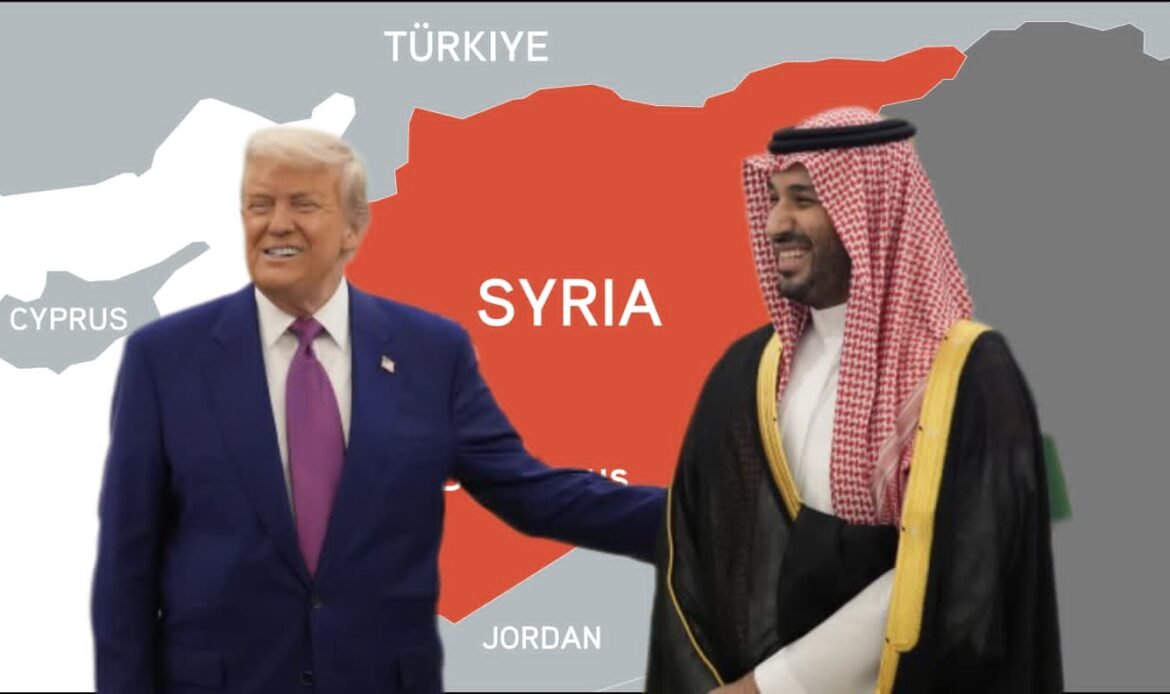Steven Sahiounie, journalist and political commentator
U.S. President Donald Trump told a packed house at the U.S.-Saudi Investment Forum, that he would lift all the sanctions against Syria, fulfilling a request from Saudi Crown Prince Mohammed bin Salman (MBS).
Trump’s decision marks the biggest chance for Syrian prosperity since the beginning of the conflict which began in March 2011 in Deraa.
After a lavish welcome to the Kingdom, Trump praised the transformation in Saudi Arabia, and credited it on MBS, and his major reform program known as Vision 2030.
“In Syria, they’ve had their share of travesty, war, killing many years. That’s why my administration has already taken the first steps toward restoring normal relations between the United States and Syria for the first time in more than a decade,” Trump said.
“There is a new government that will hopefully succeed,” Trump said of Syria, adding, “Now, it’s their time to shine. We’re taking them all off. … Good luck Syria,” Trump said, while adding, “I will be ordering the cessation of sanctions against Syria in order to give them a chance at greatness.”
“In Syria, which has seen so much misery and death, there is a new government that will hopefully succeed in stabilizing the country and keeping peace. That’s what we want to see,” he said in a speech that focused on his time in office and U.S. relations with the Middle East.
Trump noted the changes in Saudi Arabia came without any NGO forcing a western style democracy on them.
This comment harkened back to President Obama’s administration, which supported the National Democratic Institute (NDI) in Cairo, and their work which brought Mohammed Mursi, a Muslim Brotherhood member, to power, and got the American director of NDI in Cairo a five-year sentence in abstentia.
Syrian Foreign Minister Asaad al-Shibani said on X that the lifting of sanctions marked the start to reconstruction.
On May 14, before leaving for Qatar, Trump met with Syrian President Ahmed al-Sharaa on the sidelines of a meeting with the leaders of the Gulf Cooperation Council.
Syrians cheered in the streets and shot off fireworks to celebrate after Trump announced the lifting of sanctions on Syria.
The end of sanctions on Syria comes after more than a decade of civil war culminating with the ouster of President Bashar al-Assad on December 8, 2024.
Trump said the sanctions had served an important function, but it was time to move on. Human rights abuses had been one of the many reasons for sanctions.
The U.S. declared Syria a state sponsor of terrorism in 1979, added sanctions in 2004 and imposed further sanctions after the civil war broke out in 2011. The ‘Ceasar Sanctions” were the last major block issued by the U.S. Treasury Department after Congress was made aware of a photo collection taken by a Syrian, code-named Ceasar. The photos were shocking as they depicted the emaciated bodies of political prisoners in Syria.
After the troops of President Sharaa ousted Assad, the gates of the prisons were opened and thousands of prisoners poured out after being held for years without charges or trial. They began recounting their days of torture and starvation. Those that did not return home are assumed to be buried in the mass graves near the prisons.
Trump’s move is a major U.S. foreign policy shift. Analysts say the next move will be to reopen the U.S. Embassy in Damascus, after being closed for 14 years.
In April, Israeli Prime Minister Benjamin Netanyahu had asked Trump not to remove sanctions on Syria. Israel feared that the new Syrian president and his past ties to Islamic militants past could pose a threat on its northern border.
However, during the Syrian civil war, Israel opened a gate to allow injured Jibhat al-Nusra fighters to be treated in an Israeli hospital, and Netanyahu personally visited them.
After Assad was ousted, Netanyahu should have been thankful that Sharaa’s government cut off the Iranian influence and weapons to Hezbollah through Syria. Instead, Netanyahu pretends to be afraid of the leadership in Damascus. Netanyahu’s Syrian policy has always been to fuel chaos.
The US and Israel have differed over Syria, Gaza, and Iran. Trump’s officials have warned Israel was trying to pull the U.S. into a regional war against Iran, while Trump seeks peace.
Elizabeth Hoff, former director of WHO in Damascus, said many medical machines were idle because the manufacturers of the needed parts were unwilling to sell to Syrian companies. At one point, even chemotherapy medicines were unavailable because foreign makers were afraid of U.S. penalties for sanction evasion.
After the Turkish-Syrian 6.8 earthquake in 2023, donations and humanitarian aid was hampered by the sanctions; however, the U.S. issued a short-lived exemption for humanitarian purposes.
Richard N. Haass wrote in 1998, Economic Sanctions: Too Much of a Bad Thing. Haass explained that sanctions can be effectively used on small projects which are focused on bringing about a change in behavior. However, he argues that sanctions are not effective on large projects like ‘regime change’, as was the case in Syria.
As Rami G. Khouri wrote in January, “In a way, Syria’s struggle for dignified, stable statehood today is the delayed culmination of the historic but quashed decade of mass Arab uprising for democracy, pluralism, and equal rights for all. As in 1920, Syria today also tests whether external powers can allow its citizens to define themselves, and set an example for the rest of the region. If there is any Arab citizenry that can achieve this, it is the Syrians, because they have been practicing for this moment for 5,000 years.”
Steven Sahiounie is a two-time award-winning journalist



